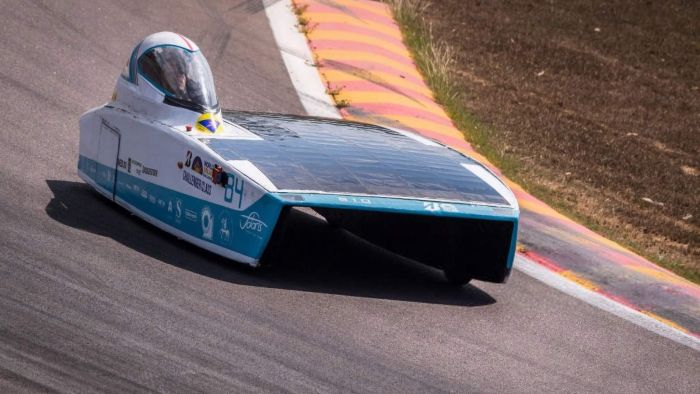About 40 teams from around the world, including from the COVID-19 hotspots of the US and Europe, are still planning to be on the start line of the World Solar Challenge in October.
Key points:
- Organisers expect to make a decision imminently on the running of this year’s race
- A lack of sponsorship, COVID-19, quarantine, and flight costs have forced some teams to forgo entry
- Some teams are discussing local challenges if they cannot make it to the Australian event
Organisers of the Darwin-to-Adelaide race have set dates and devised several contingency plans, which may include not crossing the SA-NT border, running a national race for only the six Australian teams, quarantining overseas teams, or holding a virtual-only version of the event.
Some teams are already considering organising their own local race if they cannot enter Australia.
The biennial 3,000-kilometre race has run 15 times since 1987 and has attracted teams from all over the world.
Many arrive in Darwin weeks early to test their cars.
Challenge organiser Chris Selwood AM said teams were bending over backwards to be here, despite the pandemic.
“They’re saying they’re willing to charter aircraft, quarantine, do whatever they need to do,” he said.
The 2019 race attracted 1,200 participants in 43 teams, plus 120 volunteers and officials.
Notable absences
Confirmed entrant UiTM EcoPhoton from Malaysia said it was six months behind in its preparation.
But team leader Muhammad Syazwan Bin Johari said he was optimistic despite the setbacks.




While 40 entries from 15 countries is a healthy field, some notable teams have confirmed to the ABC they will not participate: Onda Solare from Italy, Eindhoven from the Netherlands, Ardingly Ifield from the UK, and Berkeley from the United States.
Onda Solare team manager Stefano Maglio said the team would live to fight another day.
“Some of us faced the COVID illness, but luckily we are all OK,” he said.
“Isolation for two weeks could have been a problem [with the possibility of] no testing.
‘COVID-19 won’t hold us back’




Mr Selwood said the next decision on the future of the 2021 race was “imminent”, and could be made by the end of January.
“Some Australian teams could bring out two, maybe three cars, so we could do something.
“One of the contingency plans involves doing an outing back from a base. Even reversing the route could be a possibility.”
But not all agree the 2021 race should even go ahead.
Andrew Spiers from Ardingly Iffield said he felt a very difficult decision should have already been made to postpone to 2022.




“The design rules should be kept from 2021 with no changes,” he said.
Meanwhile, TopDutch team member Jamie Jankowsky said her team was advancing design and production.
“We’re driven to take part in the [race] and COVID-19 won’t hold us back,” she said.
“If the race needs to be cancelled, we will of course accept this decision and start looking for alternatives.
Madeleine Pont from ANU in Canberra said her whole team had yet to meet.




“If the race simply did not go ahead, the team would be utterly gutted,” she said.
“It would mean our team would be working toward a deadline that no longer exists.
Teams eye alternative event
But COVID-19 hibernation has benefited Sonnenwagen, one of the larger teams which has already been working on its digital communication to increase productivity.
Team member Simon Quinker said the team’s new car was developed remotely.
“With the outbreak of the pandemic, this has helped us a lot,” he said.




While it is possible there might not be an international solar challenge in Australia for 2021, teams such as Sonnenwagen may take the the concept away from Australia.
“We will look for possibilities together with the other European teams to organise a different challenge,” Mr Quinker said.
Twente, Western Sydney, Blue Sky, Jönköping, Tokai, Solaris, and Vattenfall have confirmed their entry with the ABC.







